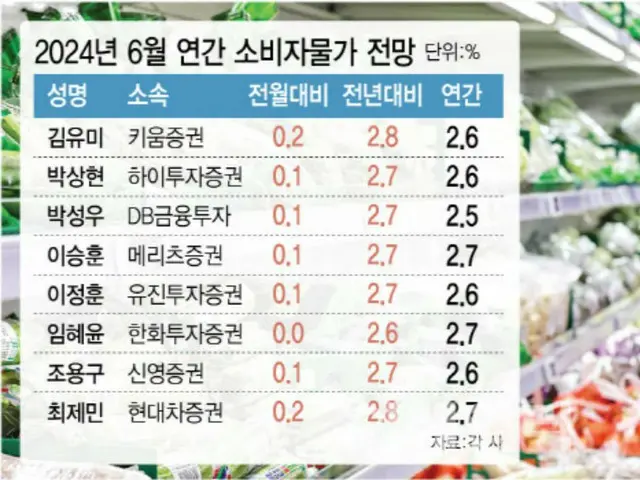This is at the same level as the 2.7% increase in May. This means that the slowdown in the inflation rate that had continued for two months in April and May has come to a halt.
The inflation rate peaked at 6.3% in July 2022 and then slowed to 2.4% in July last year.
The upward trend expanded again from the previous year (+3.4%) and continued to rise until October (+3.8%), after which it slowed down again, and in January of this year (+2.8%) it entered the 2% range for the first time in six months.
Due to the impact of rising agricultural product prices and international crude oil prices, the inflation rate rose to the 3% range again in February (up 3.1%) and March (up 3.1%), before falling back to the 2% range in April (up 2.9%) and May.
Prices are expected to have risen 0.1% (midpoint) from a month ago. The dollar/won exchange rate has risen while international crude oil prices and agricultural, livestock and fishery product prices have remained relatively stable.
According to the Korea National Oil Corporation's crude oil price information system, Offinet, the main import of Dubai crude oil to Korea,
In January, the average price per barrel was recorded at $82.56 (approximately 13,276 yen), which was more stable than May ($84.04/approximately 13,514 yen). Meanwhile, the exchange rate averaged 1,379.95 last month.
The exchange rate was 1,395 won (about 163.35 won) during trading on the 27th of last month.
"The producer price inflation rate in May was up 2.3% compared to the same month last year, and has been gradually increasing since the beginning of the year," said Cho Young-gu, a research fellow at Shinyoung Securities.
"The exchange rate has continued to rebound slightly, with the exchange rate maintaining an average of 1,370 won per month, and the rate of increase in import prices rose to 4.6 percent compared to the same month last year," he said. "These effects have been continuing to have an impact on the
"We expect this to have an impact on the inflation rate, resulting in a slight increase in the month-on-month rate," said Lee Seung-hoo of Meritz Securities. The rising trend in housing costs is also being cited as a factor in the price hike.
"Housing prices are continuing to rise in some areas of Seoul, but prices are not rising nationwide, so real buyers are continuing to enter into jeonse (deposit rental) contracts," said Ng.
"Jeonse prices are likely to continue rising in June due to supply and demand factors," he said. Experts said that unless there is a sudden change in supply, prices will remain stable until the end of the year.
They forecast inflation to slow down by 2.6% for the year (midpoint), the same as the Bank of Korea's forecast in May.
Looking at the second half of the year, the downward trend in prices is expected to stagnate until July, but is expected to stabilize from August.
It is believed that prices may rise slightly in July due to the base effect of hitting bottom (plus 2.3%). The inflation rate is expected to fall below plus 2.5% from August.
Lee Jung-hoon, a researcher at Eugene Investment and Securities, said, "Looking at domestic demand, we expect it to fall to the low 2% range after August and remain at that level."
The Bank of Korea also expects the inflation rate to fall below 2.5% in the second half of the year.
At the "June Price Stability Target Review Meeting," it was stated that "the inflation rate is expected to continue its gradual slowdown in the future," and that "Taking into account the slowdown in international crude oil prices and agricultural product price increases, prices will remain at a 5%
"It will show a gradual slowdown as expected in May."
2024/07/01 07:03 KST
Copyrights(C) Edaily wowkorea.jp 107

